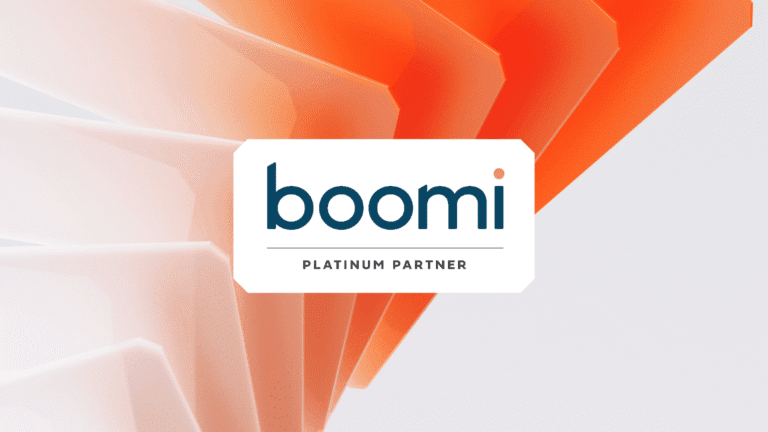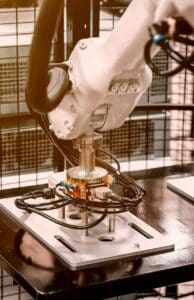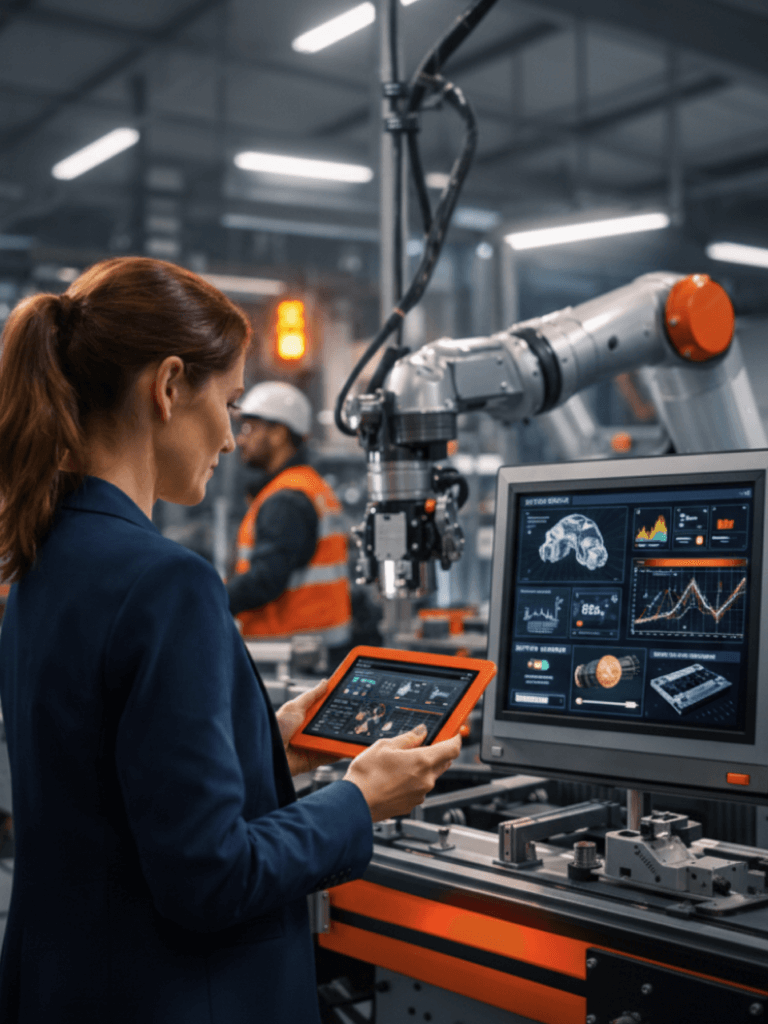- Services
Technology Capabilities
Technology Capabilities- Product Strategy & Experience DesignDefine software-driven value chains, create purposeful interactions, and develop new segments and offerings.
- Digital Business TransformationAdvance your digital transformation journey.
- Intelligence EngineeringLeverage data and AI to transform products, operations, and outcomes.
- Software Product EngineeringCreate high-value products faster with AI-powered and human-driven engineering.
- Technology ModernizationTackle technology modernization with approaches that reduce risk and maximize impact.
- Embedded Engineering & IT/OT TransformationDevelop embedded software and hardware. Build IoT and IT/OT solutions.
- Industries
- GlobalLogic VelocityAI
- Insights
BlogsMarch 1, 2026Serhiy SemenovAdam RadlinskiMichal CelejewskiMykhailo MorhalPioneering the Next Generation of Intelligent Networks
Learn how AI-powered 5G RAN optimization leverages GPU-accelerated deep learning to det...
 BlogsFebruary 23, 2026GlobalLogic
BlogsFebruary 23, 2026GlobalLogicBeyond Modernization: Reinventing the Enterprise with Agentic AI
GlobalLogic shows how Agentic AI transforms workflows into autonomous value loops, help...

- About Us
RecognitionsGlobalLogicFebruary 2, 2026GlobalLogic Achieves Platinum Partner Status with Boomi
GlobalLogic is now a Boomi Platinum Partner! See how our global scale, Boomi Lab expert...
 Press ReleaseGlobalLogicJanuary 29, 2026
Press ReleaseGlobalLogicJanuary 29, 2026Hitachi Announces Plans to Integrate GlobalLogic and Hitachi ...
Hitachi, Ltd. has announced its intent to integrate its U.S. subsidiaries, GlobalLogic ...

- Careers
Published on October 29, 2025How GenAI is Powering Manufacturing’s Pragmatic Revolution
View all articles Maksym MakivchukDirector, Industrial BU GSPShareRelated Content
Maksym MakivchukDirector, Industrial BU GSPShareRelated Content Serhiy SemenovAdam RadlinskiMichal CelejewskiMykhailo Morhal1 March 2026
Serhiy SemenovAdam RadlinskiMichal CelejewskiMykhailo Morhal1 March 2026 Ihor Tolkushyn12 February 2026View All Insights
Ihor Tolkushyn12 February 2026View All Insights GlobalLogic13 January 2026
GlobalLogic13 January 2026Let's start engineering impact together
GlobalLogic provides unique experience and expertise at the intersection of data, design, and engineering.
Get in touchGenAIIT/OT TransformationTransformation Execution and GovernanceIndustrial and EnergyThe manufacturing industry is in the midst of a technological sea change, but the story isn’t the one you might expect. While visions of fully autonomous “dark factories” capture the imagination, the reality on the ground is far more practical, human-centric, and intelligent. Manufacturers are not racing to turn off the lights; they are strategically investing in Generative AI (GenAI) to empower their most valuable asset: their people.
The Dark Factory — A Flawed Destination
The concept of a “dark factory”—a facility running 24/7 with no human intervention, with literally all lights off—has long been held up as the pinnacle of automation. Pioneers like FANUC in Japan, where robots are used to build other robots, demonstrate that the concept is technically feasible. The promised benefits are immense: massive productivity gains, reduced operational costs, and near-perfect quality.
However, for the vast majority of companies, the dark factory is a bridge too far. The barriers are formidable:
- The capital investment required for full automation is staggering, placing it out of reach for all but the largest enterprises.
- Dark factories are optimized for high-volume, low-variety production. They lack the flexibility to handle the modern demands for customization and rapid product changes. A historical attempt by IBM to build a lights-out keyboard factory in the 1980s failed precisely because its rigid automation couldn’t adapt to market shifts.
- These facilities don’t eliminate labor; they shift it to a small, highly-skilled, and expensive team of engineers needed for constant maintenance and troubleshooting. A single sensor failure can bring the entire line to a halt.
The future for most is not “lights-out,” but “lights-sparse”—a hybrid model where humans, augmented by technology, remain central to operations.
GenAI as the Ultimate Intelligent Partner
Instead of chasing the all-or-nothing dream of the dark factory, savvy manufacturers are embracing a more accessible and powerful tool: Generative AI. This technology, capable of creating new content and holding human-like conversations, is the quintessential “co-pilot”. It augments human intelligence rather than replacing it, a strategy overwhelmingly preferred by industry leaders.
GenAI’s adoption is surging because it offers a pragmatic path to value. It can be layered over existing systems, avoiding disruptive and costly overhauls. The return on investment is remarkably fast, with nearly half of top-performing manufacturers seeing value within six months.
High-Impact, Low-Disruption Wins with GenAI
The key to GenAI’s success is its ability to solve immediate, high-value problems without disrupting current operations.
- Unlocking Institutional Knowledge. Manufacturing faces a “silver tsunami” of retiring experts, taking with them decades of undocumented knowledge. A GenAI-powered “knowledge partner” can ingest technical manuals, standard operating procedures (SOPs), and repair logs. A technician can then ask in plain language, “What are the first three steps to fix error code 502?” and get an immediate, actionable answer. This dramatically cuts training time and equipment downtime.
- Accelerating Diagnostics and Maintenance. Instead of having specialists sift through mountains of data, an engineer can ask a GenAI assistant, “Show me the vibration trends for Machine 7 before its last three failures”. Many companies are already integrating this conversational analysis into their predictive maintenance tools. This empowers more staff to perform high-level diagnostics, reducing downtime and maintenance costs by up to 25%.
- Boosting Engineering Productivity. GenAI can automate the creation of tedious yet critical documents, such as compliance reports and work instructions. In the design phase, it can generate hundreds of optimized product designs based on constraints such as materials and weight, allowing engineers to innovate more efficiently. Toyota is actively using this approach to accelerate car design.
The Path to an Intelligent Factory
The story of AI in manufacturing is not one of replacing humans but of augmenting them. The strategic path forward is clear:
- Begin with a focused pilot project that addresses a specific, high-value problem with clear key performance indicators (KPIs).
- Train the GenAI system on clean, contextualized, and integrated data.
- Take small steps, evaluate, ensure your journey makes sense, and ensure that investments are directed toward the right initiatives.
- Frame GenAI as a tool to enhance the effectiveness of your workforce. Involve shop-floor users in the design and rollout to build trust and ensure the tool is genuinely useful.
The future of manufacturing isn’t dark. It’s a brightly lit, intelligent factory where human creativity and judgment, supercharged by Generative AI, drive the next wave of innovation and resilience.
Learn more about how GlobalLogic can help enterprises harness the potential of GenAI at: GenAI Services and Responsible AI in Grid Modernization.

GlobalLogic helps manufacturers embrace the changes brought by Generative AI by providing comprehensive services that guide them from initial strategy to full-scale implementation. We are taking a “problem-first, business-driven” approach, focusing on identifying specific, high-impact use cases that align with a company’s goals rather than chasing the technology for its own sake. This allows manufacturers to start with focused, agile pilot projects to demonstrate measurable value and build momentum. GlobalLogic’s services span strategic consulting, design, and engineering, helping clients navigate challenges like data readiness, intellectual property concerns, and the need for a skilled workforce. Their methodology emphasizes creating solutions that are not only powerful but also responsible, reliable, and reusable by incorporating a strong governance framework from the outset. This ensures that the AI solutions are secure, transparent, and can be adapted and scaled across the enterprise to drive innovation and efficiency while augmenting human capabilities rather than replacing them.
Learn more about how GlobalLogic can help with industrial transformation at: https://www.globallogic.com/industries/industrial-energy/.
Loading...
 How can I help you?
How can I help you?
Hi there — how can I assist you today?
Explore our services, industries, career opportunities, and more.
Powered by Gemini. GenAI responses may be inaccurate—please verify. By using this chat, you agree to GlobalLogic's Terms of Service and Privacy Policy.
